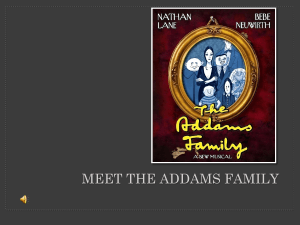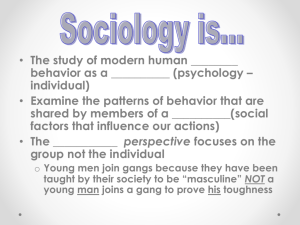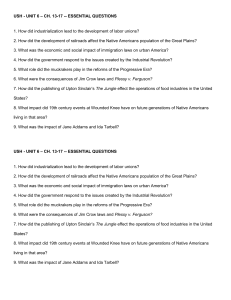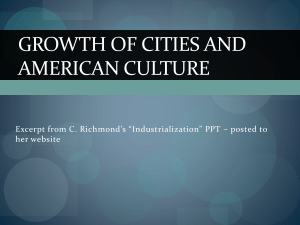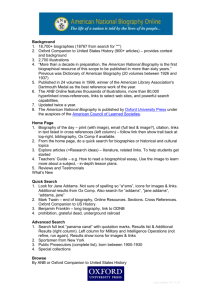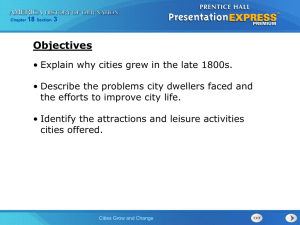Epistemic Housekeeping and the Philosophical Canon:
advertisement
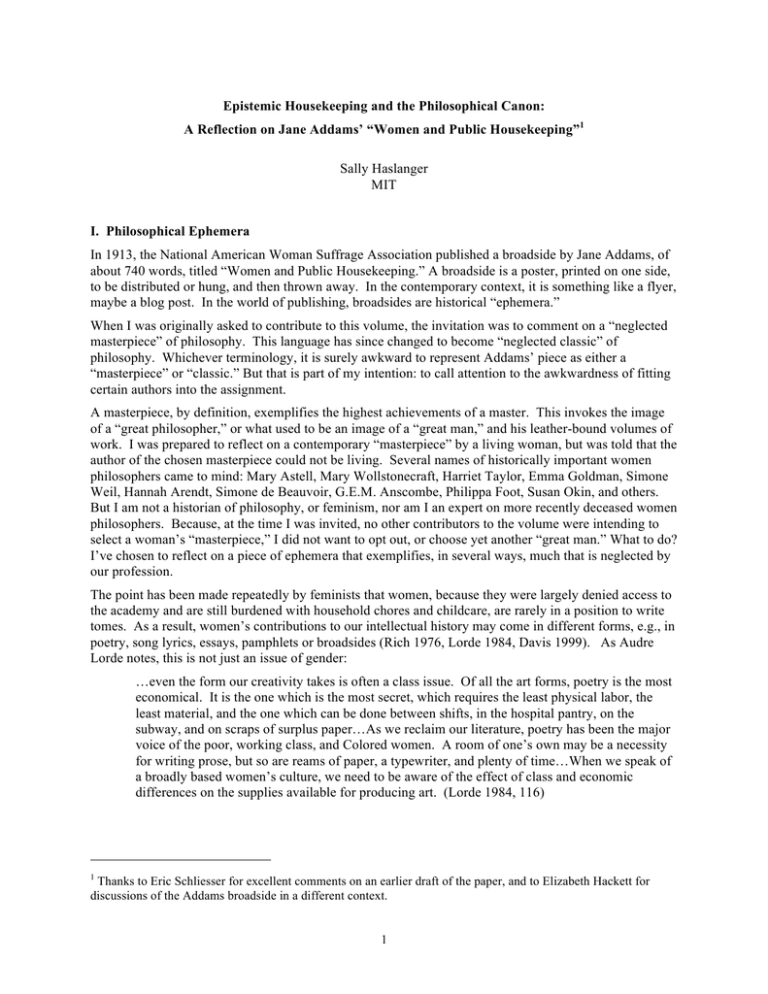
Epistemic Housekeeping and the Philosophical Canon: A Reflection on Jane Addams’ “Women and Public Housekeeping”1 Sally Haslanger MIT I. Philosophical Ephemera In 1913, the National American Woman Suffrage Association published a broadside by Jane Addams, of about 740 words, titled “Women and Public Housekeeping.” A broadside is a poster, printed on one side, to be distributed or hung, and then thrown away. In the contemporary context, it is something like a flyer, maybe a blog post. In the world of publishing, broadsides are historical “ephemera.” When I was originally asked to contribute to this volume, the invitation was to comment on a “neglected masterpiece” of philosophy. This language has since changed to become “neglected classic” of philosophy. Whichever terminology, it is surely awkward to represent Addams’ piece as either a “masterpiece” or “classic.” But that is part of my intention: to call attention to the awkwardness of fitting certain authors into the assignment. A masterpiece, by definition, exemplifies the highest achievements of a master. This invokes the image of a “great philosopher,” or what used to be an image of a “great man,” and his leather-bound volumes of work. I was prepared to reflect on a contemporary “masterpiece” by a living woman, but was told that the author of the chosen masterpiece could not be living. Several names of historically important women philosophers came to mind: Mary Astell, Mary Wollstonecraft, Harriet Taylor, Emma Goldman, Simone Weil, Hannah Arendt, Simone de Beauvoir, G.E.M. Anscombe, Philippa Foot, Susan Okin, and others. But I am not a historian of philosophy, or feminism, nor am I an expert on more recently deceased women philosophers. Because, at the time I was invited, no other contributors to the volume were intending to select a woman’s “masterpiece,” I did not want to opt out, or choose yet another “great man.” What to do? I’ve chosen to reflect on a piece of ephemera that exemplifies, in several ways, much that is neglected by our profession. The point has been made repeatedly by feminists that women, because they were largely denied access to the academy and are still burdened with household chores and childcare, are rarely in a position to write tomes. As a result, women’s contributions to our intellectual history may come in different forms, e.g., in poetry, song lyrics, essays, pamphlets or broadsides (Rich 1976, Lorde 1984, Davis 1999). As Audre Lorde notes, this is not just an issue of gender: …even the form our creativity takes is often a class issue. Of all the art forms, poetry is the most economical. It is the one which is the most secret, which requires the least physical labor, the least material, and the one which can be done between shifts, in the hospital pantry, on the subway, and on scraps of surplus paper…As we reclaim our literature, poetry has been the major voice of the poor, working class, and Colored women. A room of one’s own may be a necessity for writing prose, but so are reams of paper, a typewriter, and plenty of time…When we speak of a broadly based women’s culture, we need to be aware of the effect of class and economic differences on the supplies available for producing art. (Lorde 1984, 116) 1 Thanks to Eric Schliesser for excellent comments on an earlier draft of the paper, and to Elizabeth Hackett for discussions of the Addams broadside in a different context. 1 We might note that although to produce philosophy these days one doesn’t need reams of paper and a typewriter, one does need a computer, access to the internet, and still lots of time. And if one wants to contribute to professional philosophy, one also needs an expensive education, willing teachers, etc. In principle, contemporary analytic philosophy’s focus on argument allows us to displace the valorization of systematic treatises by great men to recognize the import and beauty of short works, sometimes consisting of just a few lines of text or an example. Consider Socrates’ conversation with the slave boy in the Meno, the Gettier argument (Gettier 1963), Burge’s arthritis example (Burge 1979). Admittedly, the focus on particular arguments encourages some to pluck an argument out of context, which risks destroying it. But we should not assume that intelligible argument requires pages of surrounding text, for the relevant context may lie in the material reality that gives rise to it. The philosopher’s interpretive task, then, is not simply textual, but social analysis. Is there progress in moving from calling attention to a “classic” rather than a “masterpiece” of philosophy? It depends on what you mean by ‘classic.’ If a classic is a widely-recognized, influential, or important work, then of course it is possible to find “classics” by deceased women. But there is a worry that relying on criteria that emphasize the influence and recognition of a work problematically narrows the options, for the goal is surely to draw attention to the quality of the work, rather than its reception. Moreover, using this idea of a “classic” makes the idea of a “neglected classic” close to an oxymoron (a widely-recognized neglected work?), though there are surely pieces that were classics in their time, but since neglected. However, another notion of “classic” is of an excellent exemplar of a particular form and, in particular, one that has lasting value. On this understanding, any argument or philosophical work, even unpublished, may be a “classic.” Because philosophy has not always been, nor is it presently, confined to professional journals and academic books, it is worth including in the search for a neglected classic more public philosophical forms such as broadsides, blog post, op eds2, and the like. So a neglected “classic” of philosophy may well be an ephemeron. They are, as a kind, possibly the most neglected. Jane Addams was an author of numerous essays and books; she is not someone who suffered the social disadvantages of class and race that made writing difficult, though there were few women philosophers in her era, so writing philosophy posed challenges. And Addams is surely neglected within the mainstream of contemporary philosophy. Although much could be gained by interpreting her essay, “Women and Public Housekeeping,” in light of her other longer, and more systematic, work, even on its own, this is a powerful essay that highlights in a few words the invisibility of women’s work and of women’s knowledge as an instance of a more broadly undervalued kind of knowledge.3 In addition, by drawing attention to women’s work, as such, she deftly challenges the public/private distinction that still dominates political philosophy. II. Public Housekeeping Let me begin by including the text of the broadside, since it is unlikely that readers will have encountered it (or, in fact, any of Addams’ work):4 ¶1 A city is in many respects a great business corporation, but in other respects it is enlarged 2 See Louise Antony’s (2011) prize op ed “Good Minus God,” http://opinionator.blogs.nytimes.com/2011/12/18/good-minus-god/. 3 I am not an expert on Addams and have not read her work extensively. The broadside I’ve chosen to discuss is, however, representative of a line of thought that she develops more fully in longer works, e.g., “Survivals of Militarism in City Government,” and “If Men Were Seeking the Franchise.” (Elshtain 2002) It is likely that the interpretation I provide of this work is anachronistic in some ways, and at odds with some of her other writings. What I hope is that it is sufficient to prompt further attention to Addams’ work (both academic and political), and to the strategy of argument I take her to be offering in this piece. 4 I have numbered the paragraphs in order to facilitate reference to them. 2 housekeeping. If American cities have failed in the first, partly because officeholders have carried with them the predatory instinct learned in competitive business, and cannot help "working a good thing" when they have an opportunity, may we not say that city housekeeping has failed partly because women, the traditional housekeepers, have not been consulted as to its multiform activities? The men of the city have been carelessly indifferent to much of its civic housekeeping, as they have always been indifferent to the details of the household. They have totally disregarded a candidate's capacity to keep the streets clean, preferring to consider him in relation to the national tariff or to the necessity for increasing the national navy, in a pure spirit of reversion to the traditional type of government, which had to do only with enemies and outsiders. ¶2 It is difficult to see what military prowess has to do with the multiform duties which, in a modern city, include the care of parks and libraries, superintendence of markets, sewers and bridges, the inspection of provisions and boilers, and the proper disposal of garbage. It has nothing to do with the building department, which the city maintains that it may see to it that the basements are dry, that the bedrooms are large enough to afford the required cubic feet of air, that the plumbing is sanitary, that the gas pipes do not leak, that the tenement house court is large enough to afford light and ventilation, that the stairways are fireproof. The ability to carry arms has nothing to do with the health department maintained by the city, which provides that children are vaccinated, that contagious diseases are isolated and placarded, that the spread of tuberculosis is curbed, that the water is free from typhoid infection. Certainly the military conception of society is remote from the functions of the school boards, whose concern it is that children are educated, that they are supplied with kindergartens, and are given a decent place in which to play. The very multifariousness and complexity of a city government demand the help of minds accustomed to detail and variety of work, to a sense of obligation for the health and welfare of young children, and to responsibility for the cleanliness and comfort of other people. ¶3 Because all these things have traditionally been in the hands of women, if they take no part in them now they are not only missing the education which the natural participation in civic life would bring to them, but they are losing what they have always had. From the beginning of tribal life, they have been held responsible for the health of the community, a function which is now represented by the health department. From the days of the cave dwellers, so far as the home was clean and wholesome, it was due to their efforts, which are now represented by the Bureau of Tenement House Inspection. From the period of the primitive village, the only public sweeping which was performed was what they undertook in their divers dooryards, that which is now represented by the Bureau of Street Cleaning. Most of the departments in a modern city can be traced to woman's traditional activity; but, in spite of this, so soon as these old affairs were turned over to the city they slipped from woman's hands, apparently because they then became matters for collective action and implied the use of the franchise -- because the franchise had in the first instance been given to the man who could fight, because in the beginning he alone could vote who could carry a weapon, it was considered an improper thing for a woman to possess it. ¶4 Is it quite public spirited for woman to say, "We will take care of these affairs so long as they stay in our own houses, but if they go outside and concern so many people that they cannot be carried on without the mechanism of the vote, we will drop them; it is true that these activities which women have always had are not at present being carried on very well by the men in most of the great American cities, but, because we do not consider it 'lady-like' to vote, we will let them alone?” Addams’ argument appears relatively straightforward: A well-governed city no longer needs to protect itself from invaders and is not properly viewed simply as a “business corporation.” Rather, it is one whose civic life is managed efficiently and effectively with a “a sense of obligation for the health and welfare of young children, and responsibility for the cleanliness and comfort of other people.” (¶2) The responsibility for managing a household teaches women how to juggle “multiform activities” (¶2) and to 3 attend to the complex demands of others to whom she often has special obligations due to their dependency. Men’s breadwinning and military responsibilities do not typically provide them with these skills and sensitivities, at least to the same degree. Therefore, the failure of cities to provide adequately for their citizens could be remedied by including women in public life, e.g., by allowing them to vote, to hold public office, etc. Moreover, women’s lives could be further enriched by such civic participation.5 This argument is radical in several ways. First, women’s attunement to the needs of others is not characterized as a “natural” talent or even something all women have, but is taken to be acquired by women due to the division of labor already in place. Second, it takes seriously that what women do is work, and pays close attention to what that work consists in. Third, it considers the skills that women develop in daily life to constitute valuable knowledge, both moral knowledge and practical knowledge. And fourth, it invites us to see civic life not as defined by the market, the military and the law – all of which are controlled by men, guided by norms of masculinity, and focused on the ownership and protection of things; instead, civic life is constituted by the relationships that sustain people, our interdependency, and the provision of things for our mutual good. In this, Addams blurs the distinction between the public and the private and, in doing so, offers an alternative vision of the public sphere that makes it part of (an expanded) women’s world, where women’s knowledge, expertise, and hard work is needed. Although in many ways straightforward, Addams’ argument deserves careful consideration, for it provides a “classic” example of social critique that reveals multiple layers of gender bias. The bias not only leads women and women’s work to be under-valued, but also causes an unfair distribution of power and knowledge and harms society as a whole. How does the argument work? More precisely, how does one go about arguing that a concept or a practice is androcentric, without commitment to an essentialist presupposition that there is a way that women (in contrast to men) are or should be? Moreover, are there assumptions we continue to make about work, knowledge, and public life that warrant critique along the lines she suggests? III. Natural, social, and normative categories Addams addresses women in her broadside and argues for the inclusion of women in public life. To begin, we should consider what it might mean to attribute certain features to women, or men, as a group, what might be meant by “women’s knowledge,” “women’s work.” On one interpretation, characterizing something as “women’s knowledge” suggests that it is knowledge that all or most women have; and often there is an added implication that women have this knowledge naturally, simply by being women. (Mutatis mutandis for “men’s knowledge.”) However, this is not Addams’ thought. 5 On June 11, 1913 the Illinois legislature passed a bill allowing women to vote in presidential elections and for “all local offices not named in the Illinois constitution.” This law was signed into law on June 26, 1913. http://www.historyillinois.org/files/Links/Illinois_History_Resource_Page/suff.html July 10, 2013. The following provides some context for the broadside: “Chicago women did not fit neatly into Chicago party politics. Neither Democrats nor Republicans made any serious overtures to securing the party loyalty of women, who, despite gaining municipal suffrage in 1913, remained largely excluded from Chicago politics. The parties refused to nominate women for municipal offices and male voters largely refused to vote for any woman who stood as candidate. Chicago women practiced party politics, but they were much more likely than men in the decades immediately following woman suffrage to vote for the candidate rather than the party and especially to vote for any woman running for municipal office. Women also failed to control any important appointed municipal offices. When Mayor Thompson's commissioner of public welfare was forced to resign in 1916, the post remained vacant until the mayoral administration of William Dever (1923–1927). This was a particularly galling political defeat for women who had prized the creation of this office to address the problems of the city's neediest people. No woman was elected to the city council until 1971, when Marylou Hedlund and Anna Langford secured seats, and Jane Byrne (1979–1983) is the only woman ever elected mayor.” http://www.encyclopedia.chicagohistory.org/pages/989.html (6/20/13) 4 Addams asks, “…may we not say that city housekeeping has failed partly because women, the traditional housekeepers, have not been consulted as to its multiform activities?” (¶1) She does not say, or even suggest, that women, simply by virtue of their sex, have a special way of knowing or a special kind of knowledge that men lack. Rather, her point is that women have traditionally played the role of housekeeper and so have learned skills and sensitivities that men, on the whole, have not. In fact, she repeats the significance of women’s traditional role twice more: “Because all these things have traditionally been in the hands of women,” and “Most of the departments in a modern city can be traced to woman's traditional activity.” (¶3) Plausibly, Addams has in mind a kind of situated knowledge. (Anderson 2012) “Women’s knowledge” isn’t knowledge one has by virtue of one’s sex, i.e., simply by virtue of one’s body type, but by virtue of the significance of that body type for one’s social position in society; in short, one gains such knowledge by virtue of one’s gender, not sex. In Addams’ social milieu, females were responsible for housekeeping (even if they also worked outside the home), and this was a responsibility of women that crossed class, race, ethnicity, etc. Although housekeeping would involve different sorts of tasks for women of different social groups, in all cases it required a sensitivity to the health and well-being of dependents: “minds accustomed to detail and variety of work, to a sense of obligation for the health and welfare of young children, and to responsibility for the cleanliness and comfort of other people.” (¶2) But even granting that the source of knowledge is gender, not sex, the generalization needs further analysis. Is it true that those gendered as women, on the whole, have the moral and epistemic sensitivities and abilities that Addams describes? Women, by virtue of their gender, are expected to fulfill certain social roles, but surely some do so badly or without developing the relevant expertise. Is Addams claiming that women should hold public office because women, in general, are morally and epistemically better suited to the job than men? Is every woman, or are even most women, better suited? (And is she really addressing her plea to all women? Although it is plausible that she was urging all women to exercise the franchise and vote, insofar as her appeal extends to holding public office, it is likely she had in mind only a subset of relatively privileged women.) It is important to note that Addams is not focused on demonstrating that men in public office at the time actually lack the qualities she takes to be necessary for good governance; nor does she provide empirical evidence that all or most women have those qualities.6 Rather, the target of her critique is a “military conception of society” (¶2) and of city government, and the related assumption that the qualities that make one a good candidate for public office are those that also enable military prowess.7 Addams’ argument is directed at the supposed link between two sets of norms: soldiering norms and governing norms. Her proposal is that we should reject the outmoded military model, and instead view society as a household and, in turn, recognize that the qualities that make for a good housekeeper would enable good city governance, viz., “public housekeeping.” Another way one might state Addams’ claim is that a good housekeeper (who is almost certainly, in the social context, a woman) is better suited to the tasks of city government than a good soldier or businessman (who is almost certainly, in the social context, a man). To see the shift in import, and assuming for current purposes that being a good housekeeper includes the transposable knowledge, skills, and sensitivities of the sort Addams describes, compare the following (simplified) arguments: 6 Elsewhere she argues at some length that men serving within the militaristic model of city government are not serving the needs of the people (“Survivals of Militarism in City Government,” (1907), in Elshtain 2002). She also argues, however, that although women are committed to the job of housekeeping, they need to be pushed (or led) into public housekeeping (“Women’s Conscience and Social Amelioration,” (1908), in Elshtain 2002; “Why Women Should Vote,” (1915)). 7 To a lesser extent, Addams also offers a critique of the business model of city government. As this plays out below, the issue is whether valuable labor is always productive of capital or whether more mundane labor that makes possible the goods of living together is equally valuable. 5 A. 1) Good city governance is a sort of public housekeeping and requires the skills and knowledge had by good housekeepers. 2a) Women are good housekeepers. 3) So women should be involved in city governance. B. 1) Good city governance is a sort of public housekeeping and requires the skills and knowledge had by good housekeepers. 2b) Good housekeepers are women. 3) So women should be involved in city governance. Argument B is both a stronger argument and more in keeping with the radical goals of Addams’ piece. For example, it is consistent with (2a) that men are also good housekeepers – possibly even better than women – and so women are not needed for public housekeeping. Worse, however, (2a) is a generic that Addams would have reason to resist and we should not endorse. Note that generic statements – often grammatically distinguished by the use of a bare plural such as ‘Tigers’ as in “Tigers have stripes” – are not ordinary quantified statements; it is not the case that a generic statement about women is just a short-hand for “All women…” or “Most women…” or even “Some women….” Sarah-Jane Leslie has argued that there are several different kinds of generics, including: characteristic (“ducks lay eggs”), majority (“cars have radios”), striking (“mosquitoes carry the West Nile virus”) and normative (“boys don’t cry”). (Leslie 2012, 363; Leslie 2013.) Plausibly, in the arguments above, both statements (2a) and (2b) are generics. If (2a) is taken to be a characteristic generic, then it implies that women, by virtue of their kind or by nature, are good housekeepers. Given the Addams’ emphasis on women’s traditional role as a basis for the relevant skills, mentioned above, this is a more essentializing claim than she would want to make. If we take (2a) to be a majority generic, the argument is not wholly plausible. As mentioned above, even if we allow that the majority of women are good housekeepers (which is by no means obvious and is not supported by evidence), (2a) does not provide what’s needed to support the conclusion, for it is consistent with there being enough men who are also good housekeepers to do the work. The final option (given that it is not a striking generic) is that (2a) expresses a normative generic: women ought to be good housekeepers or ideal women are good housekeepers. It is compatible with a normative understanding of (2a) that no women are good housekeepers, i.e., that no women are ideal women, so the conclusion does not follow. Moreover, the normative interpretation endorses the traditional norms for women, suggesting that all women should develop the skills and sensitivities that would make them good housekeepers. But Addams does not make this claim, nor should we. So we should avoid the Argument A interpretation if possible. In contrast, Argument B avoids these problems. It is plausible that (2b) states a majority generic: the majority of those who are good housekeepers, in Addams’ social milieu, are women. This is plausible, and assuming that (2b) would not be apt if there were simply no good housekeepers at all in the context, it is plausible that some women, viz., some among those women who have the expertise of good housekeepers, should be involved in city governance. What can we learn here? Many feminists have noted that arguments for women’s inclusion in this or that practice or position tend to take one of two forms – either via sameness, or via difference – both of which can be problematic. On one hand, the humanist argues that women should be included because they are in relevant respects the same as men. In the case of qualification for public office, one might argue that women have, or are capable of gaining, the same expertise that men have and so should not be excluded. The criticism of this “sameness 6 approach” is that it often does not do enough to challenge existing practices. In the case at hand, it leaves untouched the assumption that military prowess is a good qualification for holding public office and simply offers the thought that women have or could develop such qualifications. This is clearly not Addams’ goal. On the other hand, the gynocentrist argues that women should be included because they are in relevant respects different from men. Applying the strategy here would be to suggest that women (as such?) are more attuned than men to the care of the needy, and such care is important for those who hold public office. Such a strategy is usually embedded in a critique of the dominant practice in question, e.g., of the military conception of public service, and so avoids the humanist’s conservatism. However, the problem with this “difference approach” is that it tends to essentialize women by presupposing that there is a way that women are or should be by virtue of being women. This essentializing move is conveyed by use of a generic about women, e.g., women are caring, and so tends to reinforce rather than challenge traditional gender norms and roles. As a result it is conservative in a different way. Although Addams’ claims sometimes do tend in this direction, her argument rests on a much more reasonable sociological observation about the skills and knowledge that women tend to develop by virtue of the role they have been assigned. So Addams offers us an alternative to the sameness or difference dilemma.9 What we are looking for is a way to critique both the current practices and the current gender roles, and to do so in a way that doesn’t essentialize gender. How does Addams do it? • The first step is to offer a social critique the practice and its norms as inadequate given reasonable goals or purposes. (Addams begins with a critique of the military/business conception of city government.) The critique will consider, among other things, how the practice unjustly empowers certain groups (in this case, men) and contributes to the systematic disadvantage of others (in this case, women and dependents). • The second step is to consider how (some) members of disadvantaged groups might be positioned to analyze and improve the existing practice: What do they have to offer – by virtue of their experience within the system – that has not been adequately appreciated. (Addams highlights the skills and knowledge women gain by virtue of their role as housekeepers.) • The third step is to propose a change to the system that not only revalues the qualities (skills, virtues) of the disadvantaged, but also structurally repositions and empowers them as agents of change. Challenge existing practices, norms, and identities by changing the roles of those whose perspective and abilities are newly valued. (Addams proposes that women be repositioned to occupy positions of power because the skills developed through the positions they have been expected to occupy are more broadly valuable and will enable us to better achieve the proper goals of city governance.) None of these steps is easy or straightforward. The second step that requires us to see the powerful as deficient and the powerless as capable is especially challenging. One source of difficulty in appreciating what the disadvantaged have to offer is that apparently neutral and objective concepts such as “work” and “knowledge” become laden with gender bias. Let us consider how Addams reveals the bias. IV. Gendered Concepts: Work, Labor One of the most powerful aspects of Addams’ piece is the detailed description of the “multiform duties” that must be fulfilled by the civil servants of a well-run city (¶2). Addams herself knew the duties well, having founded Hull House, a settlement house in the nineteenth ward of Chicago, in 1889, and being active throughout her life in promoting social reform: 9 Others have argued, more recently than Addams and in different ways, that the sameness/difference dilemma should be rejected, e.g., Scott 1988; MacKinnon 1987. 7 Addams and her colleagues used data on tenement conditions, the existence of sweatshops, and the relation of tenement crowding and unsanitary conditions to rates of preventable diseases and ailments to press for dozens of reforms over the years….Nearly every piece of major reform during the years 1895-1930 come with Jane Addams’ name attached in one way or another, including labor and housing regulations, employment regulations for women and children, the eight-hour workday, old-age and unemployment insurance, as well as measures against prostitution, corrupt politicking, and vice and for public schools, public playgrounds, and the creation of juvenile and domestic court systems. (Elshtain 2002, xxv) Addams recognized not simply what practices, policies, and material changes were needed to improve conditions, but what sensibility was required to understand and execute the tasks. The sensibility is that of a good housekeeper. And to see this, she had to appreciate what housekeepers actually do, how hard it is, and what makes them effective when they are. Given that housekeepers were, at the time, women who managed and/or labored in the private sphere10, and city officials were, at the time, men who managed the public sphere, it took a major conceptual shift to see what women did at home to be, in effect, what men should be doing at work. Mundane labor is what makes life possible, and the labors of city managers and administrators should be more focused on the mundane, on making the life of the city and its residents possible. But the labor that goes into a life is not recognized as valuable, something to be respected. Reflecting on Hannah Arendt, Adrienne Rich notes, Yet it is this activity of world-protection, world-preservation, world-repair—the million tiny stitches, the friction of the scrubbing brush, the scouring cloth, the iron across the shirt, the rubbing of cloth against itself to exorcise the stain, the renewal of the scorched pot, the rusted knifeblade, the invisible weaving of a frayed and threadbare family life, the cleaning up of soil and waste left behind by men and children—that we have been charged to do “for love,” not merely unpaid, but unacknowledged by the political philosophers. Women are not described as “working” when we create the essential conditions for the work of men; we are supposed to be acting out of love, instinct, or devotion to some higher cause than self. (Rich 1979, 205)11 At issue here is the very idea of work. What is ‘work’? Plausibly, an explicit definition of work offered by a philosopher would make no reference to gender. (Though contemporary philosophers are rarely, if ever, concerned with such mundane topics as work.) The choice of paradigm examples of work would not count women’s activities of “world-protection, world-preservation, world-repair.” And the sensibility and skills that are part of the assigned daily activities of women don’t count as knowledge (moral or otherwise). As Rich points out, such women’s activities are “unacknowledged by the political philosophers”? Why? The political philosophers are concerned with the public realm, the state, the economy, not with housekeeping. The political philosophers implicitly conceive of the city as a business and (quasi-) military entity whose role is to manage coercive power and produce and distribute capital. The concept of work, then, is gendered and, more specifically, gendered against an economic backdrop: work is performed in the public sphere, produces things that can be bought and sold and so produce 10 Women who worked as servants “in the home” worked in the private sphere, in some sense, but it was also their workplace, and so, in another sense, not. And women who worked in factories worked in the public sphere, but were not part of the civic public. Addams would not deny that some men labor both in the public and private spheres. She was more attentive than most philosophers then or now to issues of class and immigration. Race, however, was not a dominant theme in the work of hers that I’ve read. However, this is not to suggest that she was free of racism and classism, and there is evidence that, like other progressives of her era, she was sympathetic to eugenics (Elshtain 2002, 195). Some of her writing is hard to stomach even when it includes brilliant points. 11 This is the insight at the basis of Susan Okin’s critique of Rawls. We don’t need to consider the family or home in our theory of justice, because the family is a domain governed by love, not justice. 8 capital, or involves implementing measures to protect the public/economic sphere. How might revealing the gender of work challenge the norms and roles of the public sphere and political life? Even if our manifest concept of work is ungendered, it is not hard to make the case that the operative concept is.12 As feminists have long noted, what has actually counted as work is activity that men engage in, usually certain kinds of activity in the public sphere; as a result, activity in the private sphere doesn’t count as work. If asked, “Did you work today?” answering, “Yes I washed the dishes and did the laundry,” challenges a presupposition of the question. Feeding the baby, or helping an elderly parent with their shopping doesn’t count as “work.” In many contexts, the very same activity done for a wage counts as work and is included in economic calculations of GNP, but done in the household typically by a wife, mother, or daughter, it doesn’t. (Mies 1986, Delphy , Folbre 2001) Arendt suggests a difference between work and labor that may be relevant. She says, “…unlike working, whose end has come when the object is finished, ready to be added to the common world of things, laboring always moves in the same circle, which is prescribed by the biological cycle of the living organism…” (98) Much labor concerns subsistence, and preparation of the means of subsistence. Perhaps less obvious is the labor devoted to the “unending fight against the processes of growth and decay….The protection and preservation of the world against natural processes are among the toils which need the monotonous performance of daily repeated chores.” (Arendt 1958, 100) Labor, in this sense, is more closely associated with women than work, but sometimes labor too is masculinized. Arendt argues that when laboring is recounted in “old tales and mythological stories,” it consists in men’s “heroic fights against overwhelming odds.” She points out, however, that …heroic deeds requiring great strength and courage and performed in a fighting spirit is manifest in medieval use of the word: labor, travail, arebeit. However, the daily fight in which the human body is engaged to keep the world clean and prevent its decay bears little resemblance to heroic deeds; the endurance it needs to repair every day anew the waste of yesterday is not courage, and what makes the effort painful is not danger, but its relentless repetition. The Herculean “labors” share with all great deeds that they are unique; but unfortunately it is only the mythological Augean stable that will remain clean once the effort is made and the task achieved. (Arendt 1958, 101, also quoted in Rich 1979) The point is that even if labor is sometimes recognized as valuable it is (certain) men’s labor that is valued, and does not typically consist of mundane chores requiring “relentless repetition.”13 Of course, such debased tasks are not actually restricted to women and are not evenly distributed among women either, for they fall more heavily on women of color, poor women, immigrants, and men who lack the power and privilege of race, class, and other forms of status. What does it mean to say, then, that work is gendered masculine and labor feminine, if women are fully capable of work and men often perform labor? The claim is not about mere associations between certain activities and gender, nor is it about human capabilities as they might be naturally distributed between the sexes. Rather, it is about the dominant identification, valuation, and distribution of social roles in a particular context. Work is identified as productive (especially of commodities), highly valued, and distributed to men (especially men of status); labor is identified as monotonous and non-productive, disvalued, and distributed to women (and men of low status). 12 For more on the manifest/operative distinction, see (Haslanger 1995, 2005). The distinction between work and labor that Arendt is pointing too deserves more careful consideration than I can offer here. For example, it would be important to reflect on how we conceive of the trades, men’s “labor”, concrete manual skills broadly. Do those in construction (builders, electricians, carpenters) work or labor? Do nurses, teachers, cooks, cleaners work or labor? Even if her distinction does not correspond to our linguistic intuitions, and even if it is somewhat dated for contemporary purposes, I believe it is useful for explicating Addams’ text. 13 9 Addams’ argument calls attention to the fact that work has been misidentified, labor undervalued, and that the distribution of social roles is misguided. Women’s traditional activities are productive – after all, they produce socialized individuals ready to participate in civic life; and labor in the private sphere involves knowledge and skills that are much needed in the public sphere. The sensibility required to perform women’s work and labor is transposable to domains from which women have been excluded, so the standard division of labor into public and private roles and the distribution of individuals into those roles, does not serve us well as a community. These insights are both radical and profound. Following her line of thought requires us not to take the mundane labor of daily life for granted, to be distributed to the least among us, but as something of value. This arises, I believe, from seeing those who perform such labor as valuable and as making possible our collective life. Let’s review, then, the second step in the form of critique outlined above: consider how (some) members of disadvantaged groups might be positioned to analyze and improve the existing practice: What do they have to offer – by virtue of their experience within the system – that has not been adequately appreciated? Addams accomplishes this by noticing and valuing the individuals who occupy disadvantaged social positions, and by recognizing their contribution. She looks for the sensibilities and knowledge they have by virtue of their position – not simply how closely they approximate (or not) the already valued ways of life and thought. Her insight is moral and epistemic: on her view, the paradigms of moral and epistemic life are diverse and inclusive. As we would say in more contemporary terms, both knowledge and virtue are situated, i.e., those in different social positions have access to different truths and different ways of knowing and being that should not be disregarded. Moreover, we will all be better off if we structure our communities to take advantage of this diversity. More specifically, the division of social roles into private labor (primarily assigned to women) and public work (primarily assigned to men) is misguided. V. Democracy Thus far, Addams has argued that the militaristic conception of government and the norms it entails for those who hold public office does not meet the needs of the people. She has also argued that those who have been assigned the tasks of housekeeping in the private sphere have important knowledge and skills that should be valued within the public sphere. At this point, Addams’ argumentative strategy might appear to be gynocentric, highlighting women’s difference from men in order to make the case against sexism and towards equity. There are certainly gynocentric themes in Addams’ work. However, she avoids two of the pitfalls of a simple gynocentrism: she does not take women’s difference from men to be natural, or inevitable, or desirable in the long run; and she does not take her goal to be simply the revaluation of women’s roles and capacities, but argues for a broad reorganization of society in the name of justice.14 This takes us to the third step in the strategy I outlined: Propose a change to the system that not only revalues the qualities (skills, virtues) of the disadvantaged, but also structurally repositions and empowers them as agents of change. Challenge existing practices, norms, and identities by changing the roles of those whose perspective and abilities are newly valued. As I read her, Addams offers a compelling challenge to the public/private distinction grounded in the values of epistemic and political democracy. 14 The term ‘gynocentrism’ (or ‘difference feminism’ (Fraser 1996) or ‘cultural feminism’ (Alcoff (1988)) does not have a precise definition. I’m not in the business of proposing one. Iris Young (1990), Sara Ruddick (1989) and others employ a strategy much like Addams’ and elsewhere I have labeled them (and Addams!) gynocentric feminists. (Haslanger 2006) My positioning Addams as a socialist feminist is in keeping with Alison Jaggar’s (1983) classification system in her groundbreaking work; Elshtain suggests Addams promotes “social feminism.” (2002, 248). My point is not to engage debates over classification, but to highlight a form of argument in Addams’ essay that is important and often neglected. 10 In “Public Housekeeping” and elsewhere, Addams is not simply arguing that women’s sensibilities should be recognized and valued; rather, she urges us to reposition their characteristic labor within the public sphere and demand of public officials that they take a different approach to governing: Whereas repressive government, from the nature of the case, has to do with the wicked who are happily always in the minority, a normal democratic government would naturally have to do with the great majority of the population in their normal relations to each other. (Addams 1907, Elshtain 2002, 162) Because women’s labor, thus repositioned, can be recognized as valuable, this further invites a revaluation of the activities of the private sphere. Mothers do not simply clean up the “soil and waste left behind by men and children,” but are responsible for “the nurture and education of children and the protection of the weak, sick and aged.” (Addams 1913a, in Elshtain 2002, 229) Throughout her work, Addams emphasizes that the boundary between the public and private is not only artificial but harmful, with this theme coming to a head in “If Men Were Seeking the Franchise.” (1913a) There she has the reader imagine “a hypothetical society organized upon the belief that “there is no wealth but life,”” and where “the political machinery…the franchise and the rest of it, were in the hands of women because they had always best exercised those functions.” (229) Although this exercise of the imagination has its point, Addams is not simply arguing for the revaluation of women’s activities in order to achieve gender equity (or matriarchal control!), nor is she arguing that if women occupy the roles that men currently occupy, society will be improved. Rather, she is arguing that government should be responsive and accountable to those who constitute the polity: We know better in America than anywhere else that civilization is not a broad road, with milestones indicating how far each nation has proceeded upon it, but a complex struggle forward, each race and nation contributing its quota; that the variety and continuity of this commingled life affords its charm and value. We would not, if we could, conform them to one standard. But this modern attitude which may even now easily subside into negative tolerance, did not exist among the founders of the Republic, who, with all their fine talk of the ‘natural man’ and what he would accomplish when he obtained freedom and equality, did not really trust the people after all. They timidly took the English law as their prototype…which has traditionally concerned itself more with the guarding of prerogative and with the rights of property than with the spontaneous life of the people…They depended on penalties, coercion, compulsion, remnants of military codes, to hold the community together; and it may be possible to trace much of the maladministration of our cities to these survivals, to the fact that our early democracy was a moral romanticism rather than a well-grounded belief in social capacity and in the efficiency of the popular will. (Addams 1907, Elshtain 2002, 148) In short, Addams maintains that the role of government is not simply to provide “freedom and equality” for all, for this is far from sufficient for society to be well run. A well-run city is one that is structured to provide basic goods to its inhabitants and to enable their flourishing. Good government depends on a recognition of the diversity of its members: diversity not only in their goals, aspirations, traditions, and abilities, but also in their sensibilities and skills. But these forms of diversity are valuable resources to be drawn upon in a systematic way (by the public housekeeper) rather than simply tolerated. For example, Addams frequently complains about social and political failures with respect to immigrants. She points out that “although we have scrupulously extended the franchise to the varied immigrants among us, we have not yet admitted them into real political fellowship.” (151) She continues, “The constant cry that American institutions are in danger betrays a spiritual waste, not due to our infidelity to national ideals, but arising from the fact that we fail to enlarge those ideals in accord with our faithful experience of life.” (151) Democracy, on her view, allows for a kind of social-political evolution that is essential to meet the changing needs of the individuals it serves. (291) 11 V. Epistemic Housekeeping Addams’ argument in “Public Housekeeping” raises questions not only about our political ideals, but about our epistemic ideals and our appreciation of epistemic diversity as well. What kind of knowledge, skills, and sensibilities do we value, both in political matters and more generally? And what do our epistemic values reveal about our moral priorities? Compare, for example, the doctor and the nurse, the researcher and the teacher, the caregiver and the breadwinner. Even though contemporary social roles have changed substantially in the past century, we should continue to ask whether we are adequately appreciating the sensibilities and knowledge that humans are capable of, and whether our social arrangements are fully taking advantage of them. Work, we saw, is identified as productive (especially of commodities), highly valued, and distributed to men (especially men of status); whereas labor is identified as monotonous and non-productive, disvalued, and distributed to women (and men of low status). It would appear that we continue to rely on epistemic distinctions that are gendered in this way and that assumptions about knowledge affect our social arrangements in ways that detract from the common good. As in Addams’ day, schoolteachers, childcare providers, nurses, cleaners, have important skills and sensibilities that are devalued. This is a social problem, but it is also a theoretical problem. Theory alone cannot solve social problems, but we should not perpetuate them. During this first decade of suffrage, women have learned that ideas change less rapidly than events, with the result that much political thought is always out of date and inappropriate to changed conditions. Perhaps their most important duty is to meet this need for constant adjustment and because they envisage the political situation afresh, they may enable the average citizen to escape from the deadening effects of worn-out conventional phrases, which so largely dominate political life. (Addams 1930, Elshtain 2002, 291) If Addams’ strategy is promising, however, then we do have an epistemic duty to investigate our concepts to determine how they bias us towards appreciating the capacities and contributions of some but not others and how they help sustain social structures that benefit some but do not contribute to the common good. And perhaps, as she notes, the most important duty is to envision the situation afresh, both politically and epistemically. Works Cited Addams, Jane. 1907. “Survivals of Militarism in City Government.” In Elshtain 2002, pp. 147-162. ______. 1908. “Women’s Conscience and Social Amelioration.” In Elshtain 2002, pp. 252-263. ______. 1913a. “If Men Were Seeking the Franchise.” In Elshtain 2002, pp. 229-234. ______. 1913b. “Women and Public Housekeeping.” http://etext.lib.virginia.edu/etcbin/toccernew2?id=AddWome.sgm&images=images/modeng&data=/texts/english/modeng/parsed&tag=pu blic&part=1&division=div1 ______. 1915. “Why Women Should Vote.” http://www.fordham.edu/halsall/mod/1915janeadamsvote.html ______. 1930. “Aspects of the Women’s Movement.” In Elshtain 2002, pp. 275-293. Alcoff, Linda. 1988. “Cultural Feminism vs. Post-Structuralism: The Identity Crisis in Feminist Theory.” Signs 13(3): 405-436. 12 Anderson, Elizabeth. 2012. "Feminist Epistemology and Philosophy of Science", The Stanford Encyclopedia of Philosophy, Edward N. Zalta (ed.), URL = <http://plato.stanford.edu/archives/fall2012/entries/feminism-epistemology/>. Antony, Louise. 2011. “Good Minus God,” http://opinionator.blogs.nytimes.com/2011/12/18/goodminus-god/. Arendt, Hannah. 1958. The Human Condition. Chicago: University of Chicago Press. Burge, Tyler. 1979. “Individualism and the Mental.” Midwest Studies in Philosophy 4(1): 73-121. Davis, Angela. 1999. Blues Legacies and Black Feminism. New York: Vintage Books. Delphy, Christine. 1984. Close to Home: A Materialist Analysis of Women’s Oppression. Trans. Diane Leonard. Amherst: University of Massachusetts Press. Elshtain, Jean Bethke. 2002. The Jane Addams Reader. New York: Basic Books. Encyclopedia of Chicago History. http://www.encyclopedia.chicagohistory.org/pages/989.html (6/20/13) Folbre, Nancy. 2001. The Invisible Heart: Economics and Family Values. New York: The New Press. Fraser, Nancy. 1996. “Multiculturalism And Gender Equity: The U.S. 'Difference' Debates Revisited. Constellations: An International Journal of Critical & Democratic Theory. 3(1): 61-73. Gettier, Edmond. 1963. “Is Justified True Belief Knowledge?” Analysis 23(6): 121-123. Hackett, Elizabeth and Sally Haslanger. 2006. Theorizing Feminisms. Oxford: Oxford University Press. Haslanger, Sally. 1995. “Ontology and Social Construction.” Philosophical Topics 23:2 (Fall 1995): 95125. ______. 2005. "What Are We Talking About? The Semantics and Politics of Social Kinds.” Hypatia 20(4): 10-26. Illinois History Resource Page. http://www.historyillinois.org/files/Links/Illinois_History_Resource_Page/suff.html (7/10/2013). Jaggar, Alison M. 1983. Feminist Politics and Human Nature. Lanham, MD: Rowman and Littlefield. Leslie, Sarah-Jane. 2013. “Hilary Clinton is the Only Man in the Obama Administration: Dual Character Concepts, Generics and Gender.” Manuscript. Princeton University, Princeton, NJ. ______. 2012. “Generics.” In Gillian Russell and Delia Graff Fara (Eds.), Routledge Companion to the Philosophy of Language, pp. 355-366. New York: Routledge. Lorde, Audre. 1984. Sister/Outsider. Trumansburg, NY: The Crossing Press. MacKinnon. Catharine. 1987. “Difference and Dominance: On Sex Discrimination.” In Feminism Unmodified. Cambridge, MA: Harvard University Press. Mies, Maria. 1986. Patriarchy and Accumulation on a World Scale. New York: Zed Books Ltd. Okin, Susan. 1991. Justice, Gender and the Family. New York: Basic Books. Rich, Adrienne. 1979. On Lies, Secrets and Silence: Selected Prose 1966-1978. New York: W. W. Norton & Company. Ruddick, Sara. 1989. Maternal Thinking: Towards a Politics of Peace. New York: Beacon Press. Scott, Joan. 1988. “Deconstructing Equality-vs.-Difference: or, the Uses of Post-Structuralist Theory for Feminism.” Feminist Studies 14(1): 33-50. 13 Young, Iris M. 1990. “Humanism, Gynocentrism and Feminist Politics.” In Throwing Like a Girl and Other Essays. Indianapolis: Indiana University Press. 14

